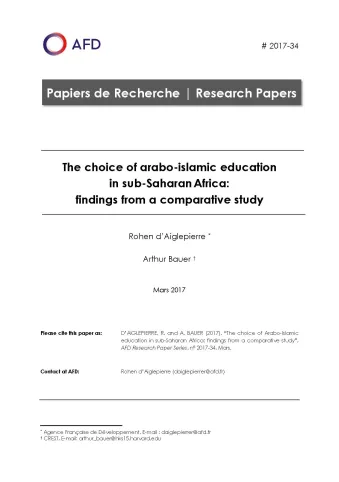Share the page
The choice of arabo-islamic education in sub-Saharan Africa: findings from a comparative study
Published on

While it is a central issue for most sub-Saharan African countries, quantification and qualification of the Arabo-Islamic education choice appear particularly poorly documented. After an inventory of existing data, we rely on representative household surveys from nine countries (Nigeria, Côte d’Ivoire, Mauritania, Gambia, Burkina Faso, Senegal, Chad, Somalia and Comoros) with data on formal Arabo-Islamic education and non-formal Arabo-Islamic education). Arabo-Islamic education appears mainly driven by non-formal Arabo-Islamic education institutions like traditional Quranic schools rather than Arabo-Islamic education structure recognized by States. We show that a large number of recorded "out-of-school” children of primary school age are in fact enrolled in Quranic schools and that there are significant differences between households depending on the education choice. Non-formal Arabo-Islamic education institutions appear as an important vector of knowledge transmission for the typically most excluded populations like the poorest households and those in rural areas, but the most excluded population appears even more as really “out-of-school”. However, Arabo-Islamic schools seem to exclude vulnerable populations as much as other formal schools in the country do. In the context of Nigeria, parents appear sensitive to the quality of formal education provision. Thus when perceived quality deteriorates, the poorest households retrieve their children from formal schools.
Useful Information
-
Authors
-
Arthur Bauer
-
Edition
-
34
-
Number of pages
-
35
-
ISSN
-
2492-2846
-
Collection
-
Research Papers
